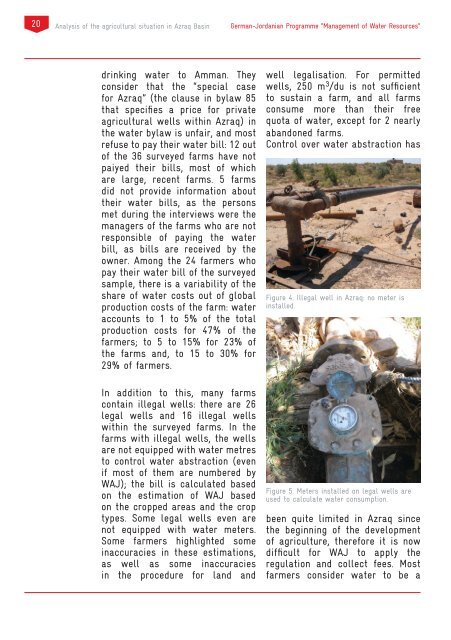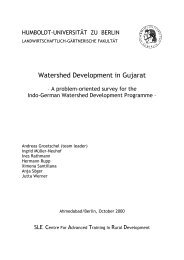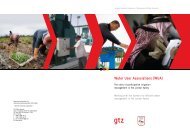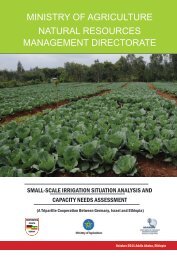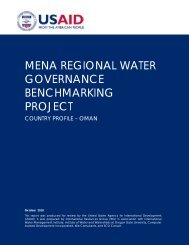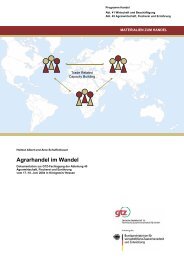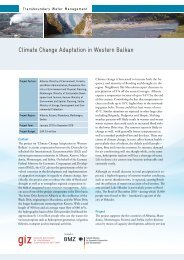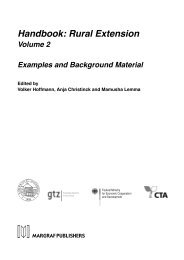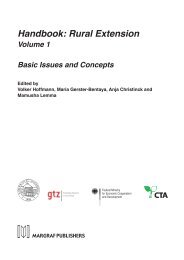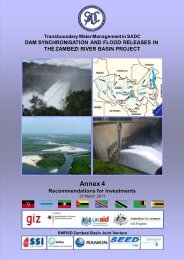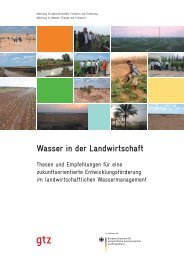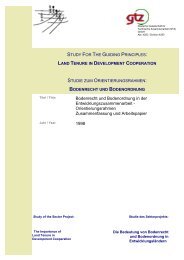Farming in the - WordPress.com
Farming in the - WordPress.com
Farming in the - WordPress.com
You also want an ePaper? Increase the reach of your titles
YUMPU automatically turns print PDFs into web optimized ePapers that Google loves.
20<br />
Analysis of <strong>the</strong> agricultural situation <strong>in</strong> Azraq Bas<strong>in</strong><br />
German-Jordanian Programme “Management of Water Resources”<br />
dr<strong>in</strong>k<strong>in</strong>g water to Amman. They<br />
consider that <strong>the</strong> “special case<br />
for Azraq” (<strong>the</strong> clause <strong>in</strong> bylaw 85<br />
that specifies a price for private<br />
agricultural wells with<strong>in</strong> Azraq) <strong>in</strong><br />
<strong>the</strong> water bylaw is unfair, and most<br />
refuse to pay <strong>the</strong>ir water bill: 12 out<br />
of <strong>the</strong> 36 surveyed farms have not<br />
paiyed <strong>the</strong>ir bills, most of which<br />
are large, recent farms. 5 farms<br />
did not provide <strong>in</strong>formation about<br />
<strong>the</strong>ir water bills, as <strong>the</strong> persons<br />
met dur<strong>in</strong>g <strong>the</strong> <strong>in</strong>terviews were <strong>the</strong><br />
managers of <strong>the</strong> farms who are not<br />
responsible of pay<strong>in</strong>g <strong>the</strong> water<br />
bill, as bills are received by <strong>the</strong><br />
owner. Among <strong>the</strong> 24 farmers who<br />
pay <strong>the</strong>ir water bill of <strong>the</strong> surveyed<br />
sample, <strong>the</strong>re is a variability of <strong>the</strong><br />
share of water costs out of global<br />
production costs of <strong>the</strong> farm: water<br />
accounts to 1 to 5% of <strong>the</strong> total<br />
production costs for 47% of <strong>the</strong><br />
farmers; to 5 to 15% for 23% of<br />
<strong>the</strong> farms and, to 15 to 30% for<br />
29% of farmers.<br />
well legalisation. For permitted<br />
wells, 250 m 3 /du is not sufficient<br />
to susta<strong>in</strong> a farm, and all farms<br />
consume more than <strong>the</strong>ir free<br />
quota of water, except for 2 nearly<br />
abandoned farms.<br />
Control over water abstraction has<br />
Figure 4. Illegal well <strong>in</strong> Azraq: no meter is<br />
<strong>in</strong>stalled.<br />
In addition to this, many farms<br />
conta<strong>in</strong> illegal wells: <strong>the</strong>re are 26<br />
legal wells and 16 illegal wells<br />
with<strong>in</strong> <strong>the</strong> surveyed farms. In <strong>the</strong><br />
farms with illegal wells, <strong>the</strong> wells<br />
are not equipped with water metres<br />
to control water abstraction (even<br />
if most of <strong>the</strong>m are numbered by<br />
WAJ); <strong>the</strong> bill is calculated based<br />
on <strong>the</strong> estimation of WAJ based<br />
on <strong>the</strong> cropped areas and <strong>the</strong> crop<br />
types. Some legal wells even are<br />
not equipped with water meters.<br />
Some farmers highlighted some<br />
<strong>in</strong>accuracies <strong>in</strong> <strong>the</strong>se estimations,<br />
as well as some <strong>in</strong>accuracies<br />
<strong>in</strong> <strong>the</strong> procedure for land and<br />
Figure 5. Meters <strong>in</strong>stalled on legal wells are<br />
used to calculate water consumption.<br />
been quite limited <strong>in</strong> Azraq s<strong>in</strong>ce<br />
<strong>the</strong> beg<strong>in</strong>n<strong>in</strong>g of <strong>the</strong> development<br />
of agriculture, <strong>the</strong>refore it is now<br />
difficult for WAJ to apply <strong>the</strong><br />
regulation and collect fees. Most<br />
farmers consider water to be a


